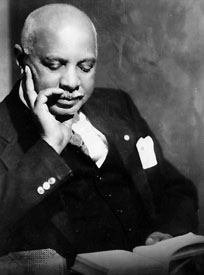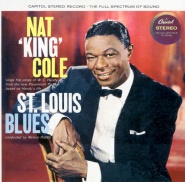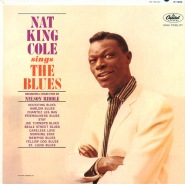A Pile o' Cole's Nat King Cole Website
Site Menu
St. Louis Blues
Recorded January 29th, 30th & 31st 1958
Nat Cole - vocals
Nelson Riddle - arranger
Lee Gillette - producer
William 'Bill' E. Brittan - binaural engineer
Capitol W-993 (mono LP)
Capitol SW-993 (stereo LP)
Capitol EAP-993 (EP)
- Overture: Love Theme - Hesitating Blues
- Harlem Blues
- Chantez Les Bas
- Friendless Blues
- Stay
- Joe Turner's Blues
- Beale Street Blues
- Careless Love
- Morning Star
- Memphis Blues
- Yellow Dog Blues
- St. Louis Blues
"Unlike the film which precipitated this project, the album St. Louis Blues is a worthy tribute to the W. C. Handy legacy."
Among the earliest and most widely known of composers and promoters of blues music, W. C. Handy (William Christopher Handy) came to be referred to as "the Father of the Blues." William handily (so sorry, couldn't resist) combined regional folk material he witnessed and documented first hand with stylistic influences from blues and folk performers of the time, and interpreting this with a contemporary flair along with his own creative character, created a formula for songs and performances that played a significant role in popularizing blues well beyond its regional origins. The songs he published are among the earliest to feature the flat thirds and sevenths that came to be known as "blue notes." A music instructor, band leader, historian, performer on coronet, singer, composer and publisher among many other ventures, William was a remarkably learned, widely traveled and successful man of diverse interests and skills.

From about 1912 through the 'teens, the twenties and up to the swing era of the mid-'30s on, William enjoyed a string of remarkable success with songs he composed, published, performed via his own Orchestra or any combination thereof. Given his interests, knowledge and travels, it is not surprising that some of his writings also proved to be of some value to the historian and musical scholar.
The era of the record album offered a particularly concise way to anthologize music and Mr. Handy's turn to be anthologized on record album in grand style came in 1954, by way of the instantly classic album Louis Armstrong Plays W. C. Handy on Columbia. Eleven of William's best remembered songs were given recordings so ebullient and infectious that they became instant highlights in the decades-old catalog. This was all the more fitting, as 'way back in 1925, the great Louis Armstrong had played coronet backing blues singer Bessie Smith and a conspicuously wheezy organ for the most famous recording of one of the best remembered of W. C. Handy's successes, St. Louis Blues.
The listener interested in hearing more about W. C. Handy, or more specifically from W. C. Handy himself, may be referred to an obscure recording by W. C. Handy from 1953 on 10" LP from the Heritage label and a few minutes of excerpts from an interview with him conducted by George Avakian available on the 1997 Columbia Legacy CD reissue of Louis Armstrong Plays W. C. Handy CK 64925.
The year of William's death, 1958 also saw the release of St. Louis Blues, a pseudo-biographical movie (or so-called biopic) purporting to be about William's life by Paramount Pictures. Star of this incredibly stiff, stilted and insipidly fictionalized film was our own Nat King Cole. Poor Nat. Aside from ineptly presented performances of a number of his compositions, any semblance to the life and times of W. C. Handy are purely co-incidental. The script is so comprehensively banal it may not even be useful to learn from as a bad example. Production and direction are so suffocatingly self-conscious and resolutely ponderous that it's not possible to make a fair assessment of Nat's potentials as an actor, as everyone before the camera can but attempt to maintain life whilst robotically reciting the specified dialog and motion. As this shredding of the film suggests, I don't consider it to be worthy of its subject. Whatever the dubious merits of the film, there was definitely a silver lining to the project: Nat recorded an album of W. C. Handy songs for Capitol to coincide with the movie.
Unlike the film which precipitated this project, the album St. Louis Blues is a worthy tribute to the W. C. Handy legacy, proving a creative success and a rightfully popular album. Presumably the film makers justified their creative license with William's life and times to themselves in the belief that their dramatic recreation would relate the spirit of its subject to current audiences. Assuming they ever had any grasp on it to begin with, the film makers lost the spirit along with just about everything else about William's story in their translation to the screen. In their translation to record of William's music, Nat King Cole and Nelson Riddle succeeded as sharply as the film makers had failed. While translated into a classic pop sensibility for then modern listeners, both the spirit and fundamental elements of William's music are preserved.
Undoubtedly, an important aspect of the successful translation lay in the fact that Nat and Nelson were not pandering to a trend or stifled by hyper-sensitivity to perceived social mores so much as interpreting the music in their own musical and stylistic sensibilities. Like William, they were themselves trend-setters whose work fairly defines a style, not so much trying to manipulate consumers of a style into buying their product. And fortunately as well, the creative commonalities were stronger than the disparity in styles. Bringing a particularly smooth approach to his vocals for this effort, Nat's renditions were certainly very different from the styles of the performers who first sang these songs, but his interpretation proved to be sound. Just as different from original fashion were the orchestrations of Nelson Riddle, but here too Nelson's style worked surprisingly well. A great many would and still do consider this album and the great Louis Armstrong Plays W. C. Handy as their favored renditions of these tunes.
Procrastination is
The Thief of Time
So all the wise owls say.
One stitch in time
May save nine
Tomorrow's not Today.
And if you put off / Somebody's bound to lose...
So begins Hesitation Blues, aptly leading the set of compositions by William Christopher Handy that comprises the bulk of St. Louis Blues. What we have there are traditional homespun American sayings becoming the bricks and morter which W.C. Handy uses as foundation material to build a song at once familiar and personally voiced. The title track St. Louis Blues comes off particularly well and Nat's way with a ballad makes Morning Star shine as I haven't heard it anywhere else. Nat may have been partial to singing Joe Turner's Blues, as he performed it as part of his live set at times.
The cover of the original issue uses a photo of Nat from the same photo shoot as Just One of Those Things released the year before. This author has no idea why, but it vaguely evokes a movie set without requiring Capitol to license a cover-worthy image from Paramount Pictures and it is a personable photo at any rate. Of particular note is the superb sound quality. Recorded at Capitol's New York studios, both the mono and (more remarkably for this era) the stereo are superbly balanced with fantastic, vivid fidelity. While the specific engineers for most of Nat's recordings are no longer documented thanks to records handling at Capitol in the 1970s, with the use of the original session tapes for the Analogue Productions SACD and LP releases, the tape box notes revealed that the engineer for the binaural (stereo) sessions was William 'Bill' E. Brittan.
Perhaps to distance the album from the film project, Capitol soon reissued the album as Nat King Cole Sings The Blues (Capitol SW 1929; some Capitol inserts listed catalog SW 1487, which seems not to have been issued), under which name it continued to do well.

